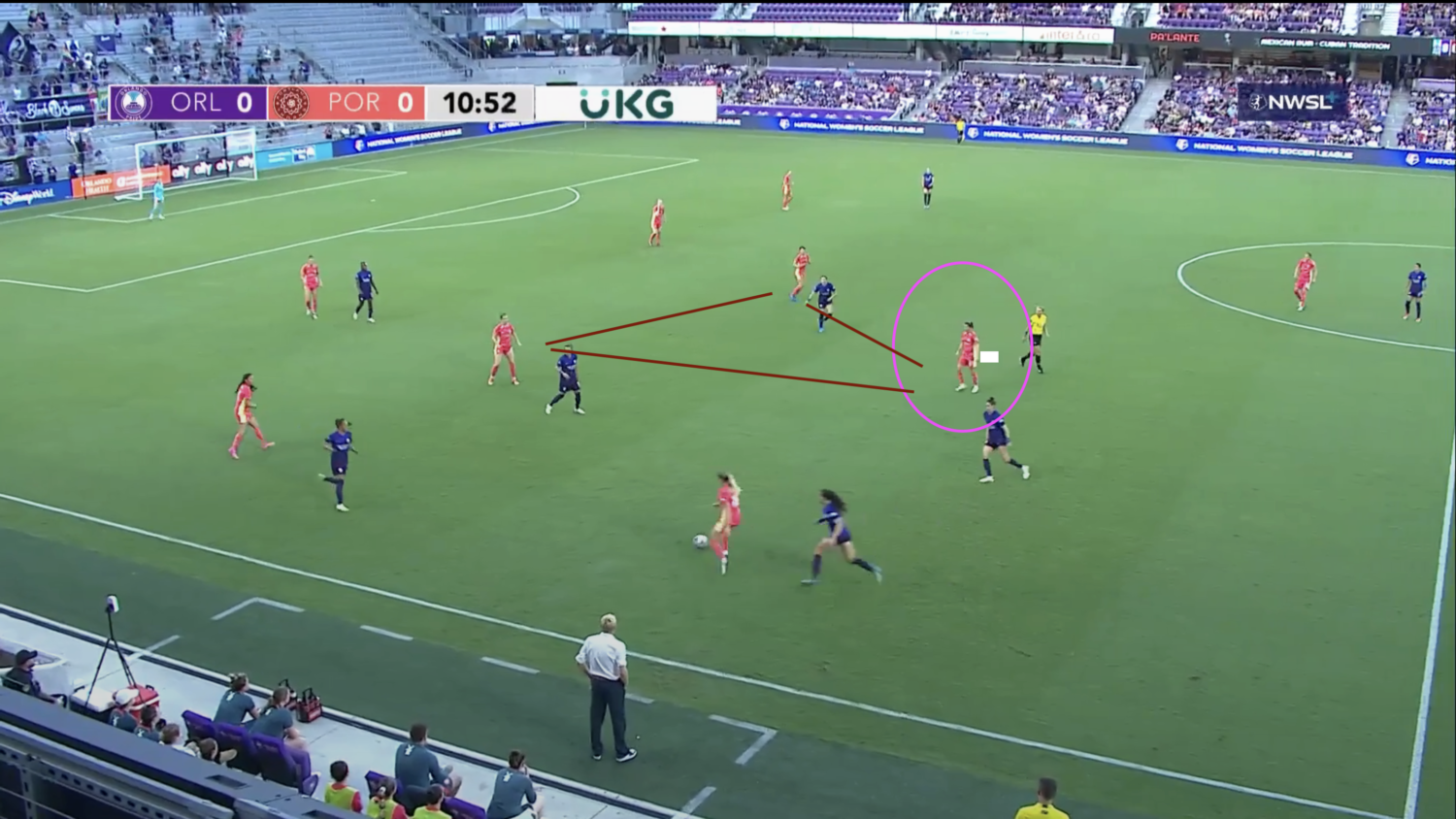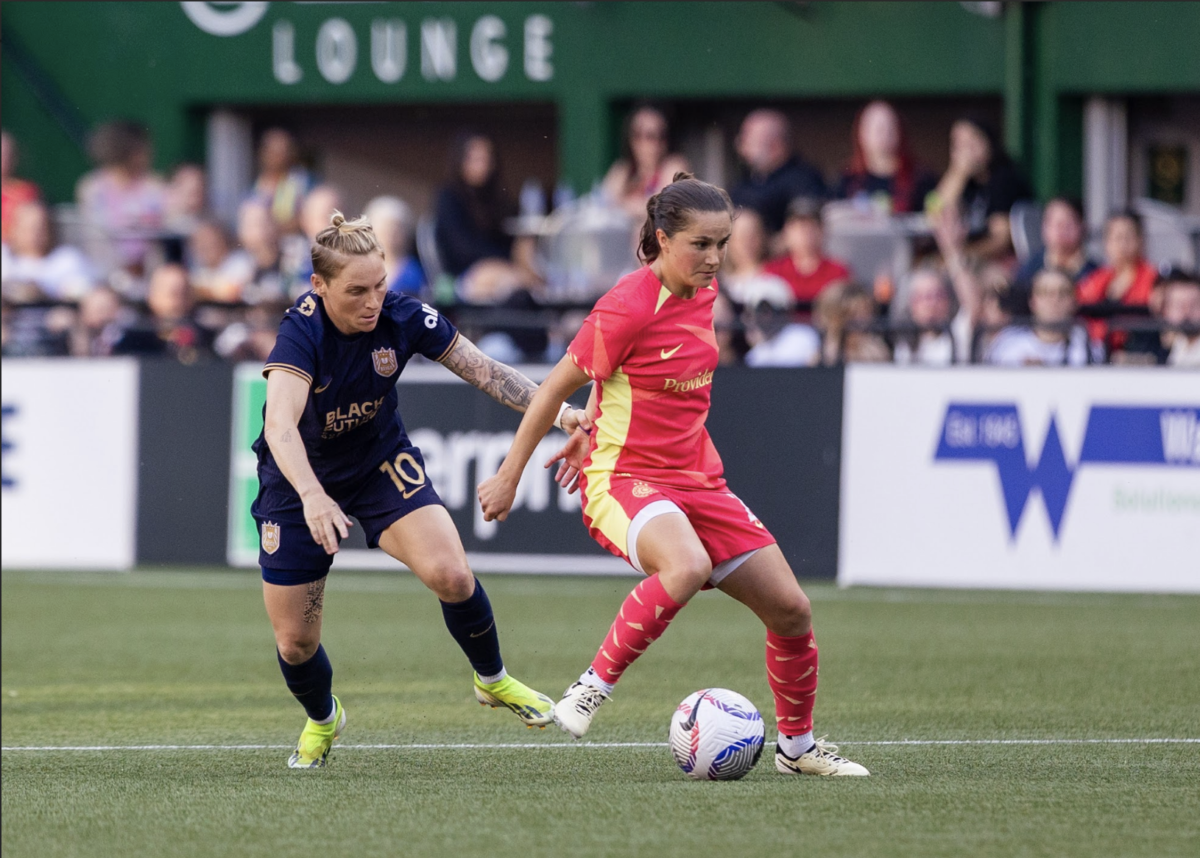The Portland Thorns’ unprecedented six-game winning streak was bound to come to an end eventually, and a clash against top-of-the-table (!!!!) Orlando Pride on a sweltering Florida Friday night finally did them in.
Initially listed on the pregame availability report as “questionable,” the Thorns went the entire 90 minutes without Sophia Smith, who was “just a day or two too early with the low leg injury,” according to interim head coach Rob Gale. Her injury is not severe or lengthy enough to keep her out of the USWNT camp this week, but hopefully Emma Hayes doesn’t make a bad first impression and play Smith before she’s 100% sound.
Going up against the league leaders and their driving force Barbara Banda, Gale needed to prove that he was more than just a vibes merchant and can tactically guide the team—especially without crucial the support pillar of Smith.
Here is what he got right, and what he got wrong.
Right: Izzy D’Aquila
Making just her third appearance of the season—and longest yet at only 28 minutes—Izzy D’Aquila came on and took full advantage of the opportunity to play at her best position as the No. 9, something she rarely got the chance to do under former head coach Mike Norris, netting the first regular season goal of her career.
Bringing on D’Aquila in the 62nd minute was a smart change by Gale, and he deserves credit where it is due, but unfortunately, he also needs to be held accountable for his initial starting XI and the poor showing of the first half.
Gale started a front line of striker Christine Sinclair, left winger Olivia Moultrie, and right winger Janine Beckie. Only one of those three players was playing in their preferred and strongest position, and only one of them is fast (the answer is Beckie to both). With no speed up top, the Thorns were absolutely smothered by the Pride’s press in the first half and could not break through. Portland only managed three shots (and only one on target) in the first half to Orlando’s 14, and they only had six touches in the Pride’s 18-yard box—an absolutely abysmal stat line for the Thorns.
Once Sinclair was removed from the game, the pace picked up immediately. The Thorns tripled their number of shots and entered the Pride’s box 15 times. While Orlando’s halftime substitution of Banda very well could have been the reason for the Thorns’ increased number of touches and possession, adding the speed of both D’Aquila and Payton Linnehan to the front line was a tremendous help in allowing the Thorns to successfully press.
The question going forward becomes: How can D’Aquila get on the field more as a No. 9 when Smith’s name is written in on the starting XI in that position in permanent ink? With Morgan Weaver out until after the Olympics in August at minimum, and Linnehan still unable to play major minutes, the Thorns lack options out wide. In the 2023 season, D’Aquila got some minutes out wide, but did not get any return on goal involvements. The best course of action moving forward, and to prevent Smith from picking up additional knocks that can keep her off the pitch, is for D’Aquila and Smith to split minutes at the No. 9. Besides the season opener against the Kansas City Current where Smith played 75 minutes, she has consistently gotten 85 or more minutes in each game. While the Thorns rarely had the commanding 2+ goal lead that might have given Gale the confidence to sub Smith off early, a valid argument could be made that against consistently weak teams like the Houston Dash, Angel City, and the Utah Royals, D’Aquila can get the start and the bulk of the minutes while Smith rests.
Another option that requires Gale to be a bit more bold in his formations is to have Smith and D’Aquila start in a front two. This change would allow the Thorns to build up the pitch centrally—the region where they have had the most success since Gale took over—and D’Aquila can unleash the through balls she consistently played forward for fellow Bronco Kelsey Turnbow at Santa Clara.
Wrong: Jessie Fleming
On the whole, the Thorns’ midfield had a collectively bad game, and it was probably Sam Coffey’s worst performance in a Thorns jersey. The starting trio of Hina Sugita, Coffey, and Jessie Fleming were unable to possess the ball, and they routinely lost it to the Pride’s intense pressure. However, 11 games and eight starts into the season, I think it is a fair time to examine how well Fleming has adjusted to the league and question whether or not she is a starting-caliber player for the Thorns.
Fleming was pulled from the game at halftime, after a 45 minutes where she was clearly the weakest link of the three midfielders, and replaced by Linnehan. The move allowed Moultrie to slide back to her more natural central position. In those 45 minutes, Fleming had 10 completed passes over 16 total touches, and she won none of her duels or tackles.
With two coaches already in her short tenure at the Thorns, it is possible Fleming’s poor positioning is due to a lack of clear instruction and tactics from the coaches. But regardless, with the international and elite club-level experience that Fleming has under her belt at only 25, her field awareness should be much higher.

Per FBref, Fleming is in the 50th percentile of progressive passes compared to other midfielders and in the 80th for progressive runs. As the player at the top of the Thorns’ midfield triangle, Fleming should be the most creative player, playing balls forward to unlock the Portland forwards. However, that is not the role that she has been playing. She more often than not opts for short, less than 10-yard passes either perpendicular or backward (an average of 56% of her passes per-90 minutes are short; an average of 40% are medium, between 15 and 30 yards).
Despite playing in that more advanced midfield role, Fleming only has one assist on the season and holds an average of 0.12 expected assists per 90 minutes. For comparison, Moultrie, in the same eight starts, has 0.21 expected assists and 0.42 expected goals and assists per 90 minutes. As the two players are competing for the same position, it’s fair to say at this point that Moultrie is the more productive player and should be starting in that attacking midfield role. Moving her into that space also opens up a spot on the wing for Linnehan to slide into.
As of right now, Fleming is not fitting into the system that Rob Gale is trying to play, and by placing her into the midfield, other players like Moultrie and Sinclair are forced to play out of position, which ultimately hurts the team as a whole. Fleming’s hefty transfer fee, international resume, and Barclay’s experience does not—and should not—make her a guaranteed starter in the league.

